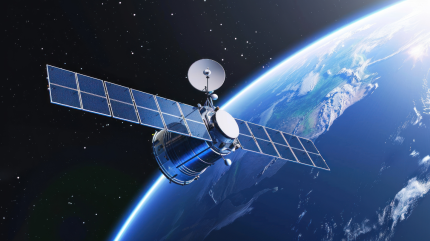
BioOrbit aims to kick off pre-clinical trials to study protein crystals for monoclonal antibodies (mAbs) produced in a pharmaceutical factory in space in 2026.
The UK-based company hopes that production in space would allow therapies that are currently administered intravenously (IV) to be administered subcutaneously.

Discover B2B Marketing That Performs
Combine business intelligence and editorial excellence to reach engaged professionals across 36 leading media platforms.
Speaking during a panel at HLTH Europe, taking place in Amsterdam on 16-19 June, BioOrbit CEO Dr Katie King said that the microgravity environment enables the production of purer crystals, resulting in more concentrated therapies.
King said: “Manufacturing drugs in space sounds like sci-fi – but the time is now. Crystallisation is a process that is better in space compared to on Earth, and that’s because gravity inhibits that process. By doing it in space, you get much more uniform and perfect crystals than you can produce on Earth. When that is applied to antibody drugs, you get uniform and reproducible crystals of these antibodies that enable you to produce a concentrated drug formulation.”
King added that the reason why microgravity assists in this is that you do not have sedimentation or convection currents in space, meaning during production, the crystals do not sink to the bottom, creating a better growth pattern.
She explained that this manufacturing will likely take place within satellites, but there is still a way to go to fully understand the capabilities.

US Tariffs are shifting - will you react or anticipate?
Don’t let policy changes catch you off guard. Stay proactive with real-time data and expert analysis.
By GlobalDataGoing into the timeline of BioOrbit’s ambitions, King explained: “Our first step is to develop our proof-of-concept manufacturing line, which is flying this summer to the International Space Station (ISS). Then the next step is to produce meaningful quantities of these crystals, which will be next year.”
“Then, we will need to run pre-clinical trials of these crystals, which will be in 2026 or 2027. After that, it will be about compliance and regulation, as we must ensure that all our processes adhere to pharma regulations. Regulation has not been done in a space environment before, so we recognise we’ve got some hurdles to jump through, but these conversations are starting and that is exciting.”
Healthcare in space has been a fast-evolving topic. In February 2025, Auxilium’s 3D printer built eight implantable medical devices for peripheral nerve repair on the ISS in two hours.
Microgravity is also a significant factor in why space is optimal for tissue manufacturing. Structures would usually collapse but this is not the case in space, as they remain stable, allowing the potential for organ creation from a patient’s stem cells.




